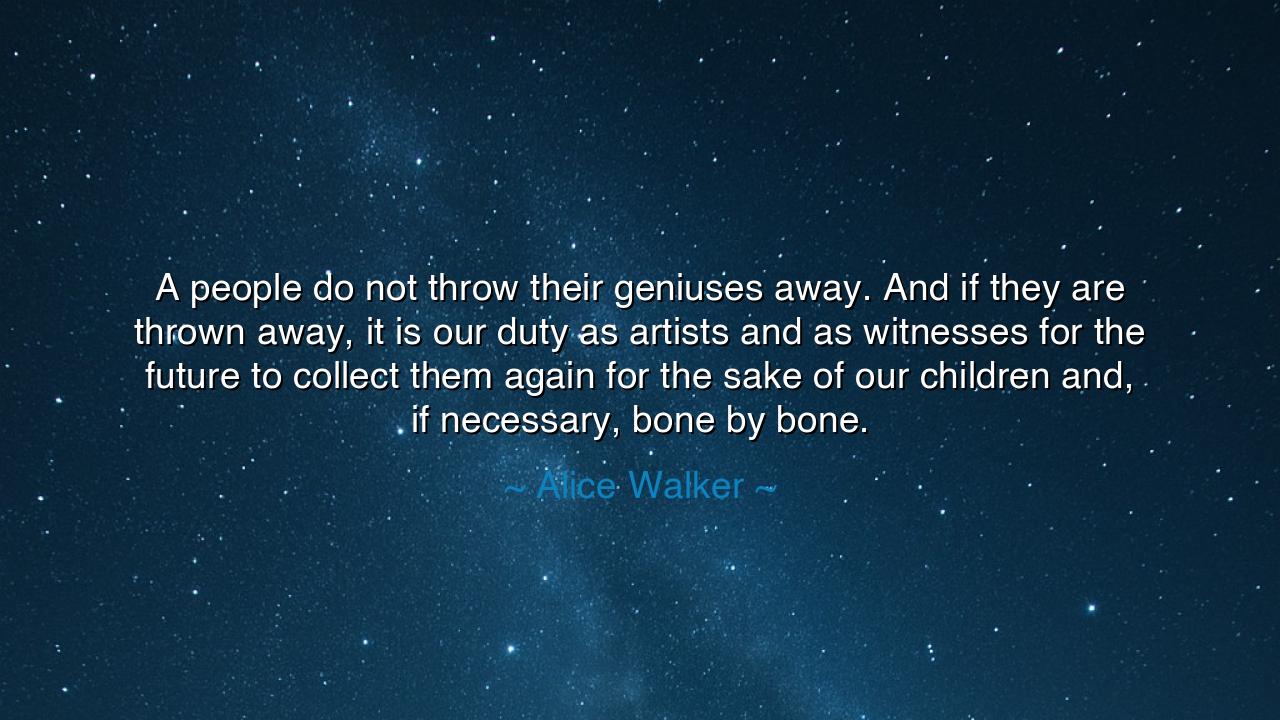
A people do not throw their geniuses away. And if they are thrown
A people do not throw their geniuses away. And if they are thrown away, it is our duty as artists and as witnesses for the future to collect them again for the sake of our children and, if necessary, bone by bone.






"A people do not throw their geniuses away. And if they are thrown away, it is our duty as artists and as witnesses for the future to collect them again for the sake of our children and, if necessary, bone by bone." These words, spoken by the brilliant Alice Walker, carry the weight of a powerful truth: the genius of a people—their artists, thinkers, and creators—must never be discarded, for they are the soul and heartbeat of a culture. When a society turns its back on its greatest minds, it forsakes its own potential, its own future. Walker, with this bold declaration, challenges us to recognize the preciousness of genius in all its forms, and to stand vigilantly against the forces that seek to silence or forget it. Even when these brilliant voices are lost or ignored, it becomes the duty of the artist, the witness, to gather these pieces of the past, to reclaim them for the future, and to ensure that they are never forgotten.
In the ancient world, wisdom was not merely found in the libraries of kings, but in the voices of philosophers, poets, and visionaries. The Greeks and Romans understood that the genius of their culture was something to be nurtured, preserved, and passed down. Figures like Socrates, Plato, and Aristotle were more than scholars—they were the lifeblood of the ancient intellectual tradition. Yet, even in their time, the fate of these great minds was precarious. Socrates, for example, was condemned to death for his ideas. He was cast out by the very society that once embraced him. But what made Socrates immortal was not just his wisdom, but the dedication of those who followed him—those like Plato, who took the bones of his teachings and carried them forward into the future. In a way, this is the lesson Walker teaches us: genius cannot be allowed to fade into the dust; it must be reclaimed and brought back to life for the sake of generations to come.
The ancient Egyptians, too, understood the value of genius. The pyramids, those monumental structures of human ingenuity, were built not just by laborers, but by the brilliant minds of architects and engineers whose names we may never know. But the spirit of their work lives on, as these structures continue to stand as a testament to the heights of human achievement. The knowledge, skill, and creativity involved in their construction were not discarded—they were passed down through generations, safeguarded in the form of symbols and stories. Much like the work of artists and witnesses of today, their genius was collected and preserved, ensuring that future generations could marvel at it, learn from it, and build upon it.
Consider the plight of Zora Neale Hurston, whose work was largely overlooked for much of her life. As an African American writer and anthropologist, Hurston’s brilliance was dismissed by mainstream literary circles. But in the 1950s, her works were rediscovered, largely due to the efforts of those who refused to let her genius die. Alice Walker herself played a crucial role in this rediscovery, seeking out Hurston’s writings and reclaiming her place in literary history. Walker, like the artists and philosophers of the ancient world, recognized the value of genius that had been neglected, and took it upon herself to ensure that it would be remembered for the future. Hurston’s voice, once lost, was resurrected, and now stands as a beacon for future generations, teaching us the importance of preserving the wisdom and beauty that came before us.
The act of collecting genius, as Walker so eloquently puts it, is not just the responsibility of the artist—it is the duty of every individual who cares about the legacy of the past and the promise of the future. When society fails to recognize, honor, and protect the contributions of its greatest minds, it risks losing not only the knowledge and insight they provide, but also the very spirit that drives innovation and progress. The artist, the witness, must take up the mantle, bringing back the lost voices and ideas that hold the key to shaping a better world.
The lesson here is one of preservation and action. Just as the ancient cultures understood the importance of their intellectual legacies, so too must we. It is our responsibility to ensure that the genius of today—whether it be in the form of art, science, philosophy, or culture—is protected, nurtured, and passed on to future generations. Walker's call to collect them again, bone by bone, is not merely metaphorical; it is a call to action. When genius is neglected, we must rise to the occasion, doing what is necessary to ensure that it does not fade into obscurity.
In our own lives, we must honor the geniuses around us—those who create, who challenge, and who inspire. We must preserve their contributions, ensuring that their voices continue to resonate across time. Whether it is the work of a writer, a musician, an inventor, or a teacher, we are all part of a greater story. Our task is to cherish those who shape it, to protect their legacy, and to carry it forward. As artists, as witnesses, and as citizens of the future, we must each take part in the collective effort to safeguard and celebrate the brilliance of those who came before us. For it is in doing so that we ensure that their genius will continue to light the way for generations yet to come.






AAdministratorAdministrator
Welcome, honored guests. Please leave a comment, we will respond soon